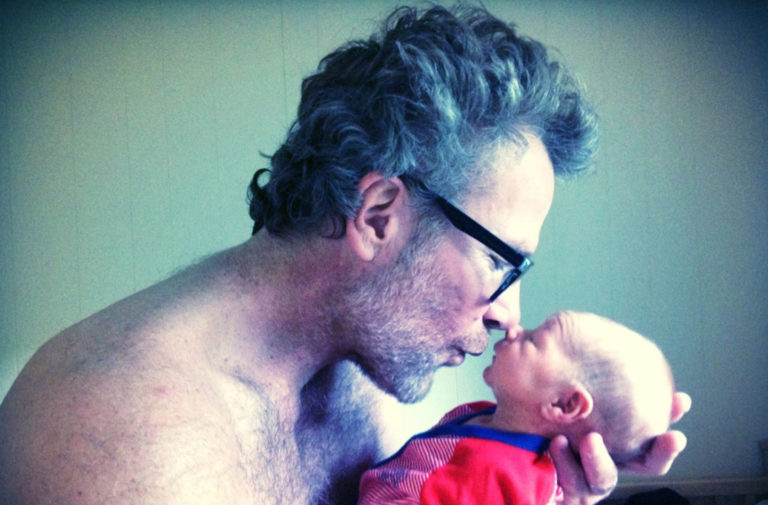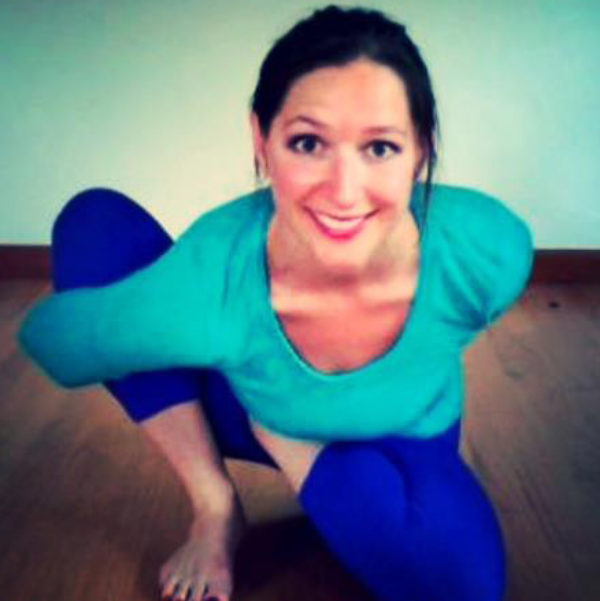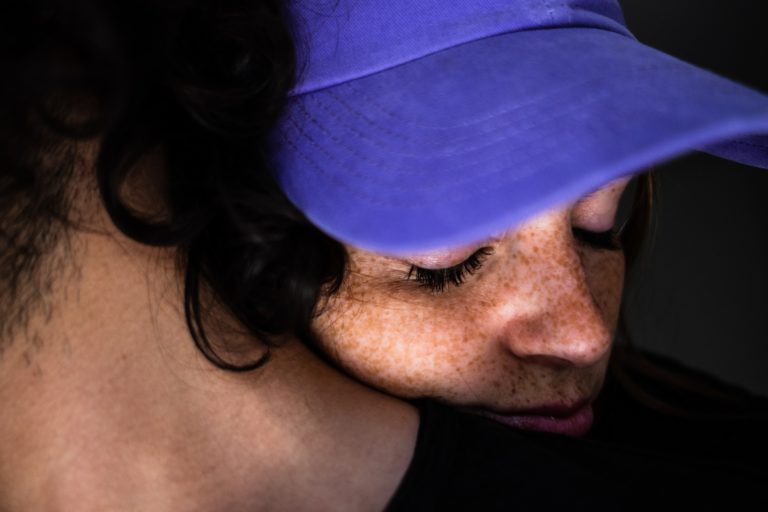
The author's husband with their child.
What Masculinity Looks Like
My husband Robb and I had just taken our son Duke for his first hike. He was three weeks old and not getting enough to eat. We were clueless and exhausted. It was that heavy, airless period of nursing every two to three hours. Escaping into nature felt salvific, transgressive, surreal.
I gingerly unbuckled all seven pouds of newborn baby, sliding him carefully out of his gyro-sandwich infant carrier and into Robb’s arms. I stepped into the kitchen to wash my hands before nursing again. When I turned around and walked into the nursery, there was Robb cradling little Duke in his mammoth arms.
In the yoga world, we use the Sanskrit phrase “Sthira Sukham Asanam” to describe the complementary balance of effort and ease, strength and softness necessary in every pose. Sutra 2.46 lays out the way in which each asana (literally, “seat”) should be a kind of relationship, an ongoing conversation between steady, active presence and yielding, relaxed stillness. The combination of the two qualities creates a yin-yang kind of wholeness that is strongly rooted, firm in foundation, confident and stable — and at the same time malleable, easy to adapt, gentle in spirit and undeniable in the face of transition.
As a headstrong twenty-something in defiance of my conservative Nebraska upbringing, I’d studied feminist and queer theory. Flying solo in San Francisco, I cultivated an urban life that felt creative and independent and deliberately queer, chanting and meditating as a yoga teacher by day and tossing back tequila shots as a bartender by night. It felt transgressive to savor the best of both stereotypically feminine and masculine realms. But I’d given up hope of finding a partner with a similar sensibility.
When I met my husband (unsuspecting, in a yoga class), I fell in love with his finely-tuned practice of Sthira Sukham Asanam. A longtime yogi, he was capable of being at once resolute and confident, tender and gentle. He could throw back a beer in one breath and quote Hafiz in the next.

One of the first qualities people always notice about Robb is his big lumberjack hands. He could’ve been Paul Bunyan in a former life: fingers like tree trunks, perfect for swinging an ax. And yet, there’s a measure of softness to his being, the kind that gets all squishy around babies and orchids; the kind that brings sprigs of jasmine home for the kitchen table.
So when our son came along, I knew Robb would carry that same mindfully-calibrated masculinity into fatherhood.
Duke was born and the doctor launched him naked and wailing on my chest. He pressed up in a triumphant cobra pose. I looked down to see tiny versions of Robb’s massive paws there pressing on my sweaty skin. He was a yogi from that first breath.
Like every naïve couple with a baby registry, we thought we were prepared. But parenting is the hardest yoga we’ve ever done.
We practice in stolen moments, squeezing in half-assed headstands during breakfast and unrolling the mat late at night, the baby monitor standing sentinel at the top. We sprawl exhausted on the playroom floor and fold forward into giggling Paschimottanasana while Duke scrambles up and sits on our backs.

The most challenging practice, though, has been finding center, grasping at sattva in the moments of sleeplessness, of relentless, bone-breaking parenting. Fumbling to stay calm at the changing table when the little man wriggles off. Struggling not to yell when he refuses to get into his high chair for the fiftieth time. Trying to be tender with one another when we’re both rundown and under-slept and haven’t showered in four days.
The idea is, of course, not to nail every posture (or every diaper change), but to let go and roll with the punches, to allow the sensations — the fear, the anger, the exhaustion — to move through you and to just get out of the way, exhaling into the quiet that’s always there under the chaos, paying attention to how everything is perpetually changing from day to day, moment to moment, breath to breath.
And then it passes.

When Duke was six months old, we moved from our isolated garden cottage in Inverness to a home closer to civilization. Robb did the packing while I kept Duke entertained. The few boxes I threw together were disorderly, haphazard, impatient.
After the move, I sorted through Styrofoam and packing tape while Duke slept in his Ergo. I was setting up the small family altar that holds our wedding vows, a statue of the Buddha, Grandma Jane’s rosary, and Grandpa Larry’s Lenten cross when I found a curiously weightless package there amidst the statues and the mala beads.
Intrigued, I loosened the string and began to unroll the tissue paper. Robb had very carefully, tenderly wrapped up a feather we’d found hiking and placed it alongside the contents of the altar. A single feather.
Those huge lumberjack hands, lovingly enveloping a tiny grey feather in crinkly white tissue. This is what masculinity looks like.


